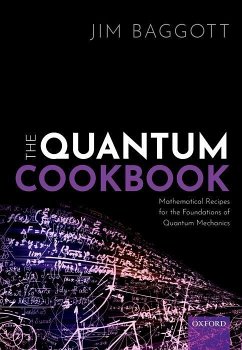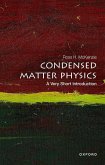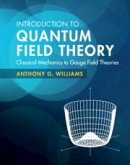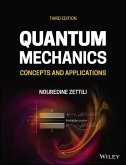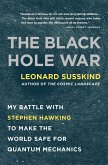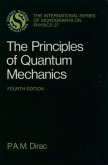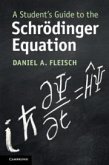Jim Baggott (Freelance science writer Freelance science writer)
Quantum Cookbook
Mathematical Recipes for the Foundations of Quantum Mechanics
Jim Baggott (Freelance science writer Freelance science writer)
Quantum Cookbook
Mathematical Recipes for the Foundations of Quantum Mechanics
- Broschiertes Buch
- Merkliste
- Auf die Merkliste
- Bewerten Bewerten
- Teilen
- Produkt teilen
- Produkterinnerung
- Produkterinnerung
The book combines popular and textbook presentation. It aims not to teach readers how to do quantum mechanics but rather helps them understand how to think about quantum mechanics. The real source of confusion in quantum mechanics does not originate in the mathematics, but in our understanding of what a scientific theory is supposed to represent.
Andere Kunden interessierten sich auch für
![Quantum Mechanics with Concept Maps Quantum Mechanics with Concept Maps]() Michael Wick (Germany Hochschule Coburg)Quantum Mechanics with Concept Maps19,99 €
Michael Wick (Germany Hochschule Coburg)Quantum Mechanics with Concept Maps19,99 €![Condensed Matter Physics: A Very Short Introduction Condensed Matter Physics: A Very Short Introduction]() Ross H. McKenzieCondensed Matter Physics: A Very Short Introduction8,99 €
Ross H. McKenzieCondensed Matter Physics: A Very Short Introduction8,99 €![Introduction to Quantum Field Theory Introduction to Quantum Field Theory]() Anthony G. Williams (University of Adelaide)Introduction to Quantum Field Theory68,99 €
Anthony G. Williams (University of Adelaide)Introduction to Quantum Field Theory68,99 €![Quantum Mechanics Quantum Mechanics]() Nouredine Zettili (USA Jacksonville State University)Quantum Mechanics40,99 €
Nouredine Zettili (USA Jacksonville State University)Quantum Mechanics40,99 €![The Black Hole War The Black Hole War]() Leonard SusskindThe Black Hole War13,99 €
Leonard SusskindThe Black Hole War13,99 €![The Principles of Quantum Mechanics The Principles of Quantum Mechanics]() Paul A. M. DiracThe Principles of Quantum Mechanics54,99 €
Paul A. M. DiracThe Principles of Quantum Mechanics54,99 €![A Student's Guide to the Schrödinger Equation A Student's Guide to the Schrödinger Equation]() Daniel A. Fleisch (Ohio Wittenberg University)A Student's Guide to the Schrödinger Equation29,99 €
Daniel A. Fleisch (Ohio Wittenberg University)A Student's Guide to the Schrödinger Equation29,99 €-
-
-
The book combines popular and textbook presentation. It aims not to teach readers how to do quantum mechanics but rather helps them understand how to think about quantum mechanics. The real source of confusion in quantum mechanics does not originate in the mathematics, but in our understanding of what a scientific theory is supposed to represent.
Produktdetails
- Produktdetails
- Verlag: Oxford University Press
- Seitenzahl: 314
- Erscheinungstermin: 10. März 2020
- Englisch
- Abmessung: 244mm x 170mm x 17mm
- Gewicht: 604g
- ISBN-13: 9780198827863
- ISBN-10: 0198827865
- Artikelnr.: 57612765
- Herstellerkennzeichnung
- Libri GmbH
- Europaallee 1
- 36244 Bad Hersfeld
- gpsr@libri.de
- Verlag: Oxford University Press
- Seitenzahl: 314
- Erscheinungstermin: 10. März 2020
- Englisch
- Abmessung: 244mm x 170mm x 17mm
- Gewicht: 604g
- ISBN-13: 9780198827863
- ISBN-10: 0198827865
- Artikelnr.: 57612765
- Herstellerkennzeichnung
- Libri GmbH
- Europaallee 1
- 36244 Bad Hersfeld
- gpsr@libri.de
Jim Baggott is an award-winning science writer. He trained as a scientist, completing a doctorate in chemical physics at the University of Oxford in the early 80s, before embarking on post-doctoral research studies at Oxford and at Stanford University in California. He gave up a tenured lectureship at the University of Reading after five years in order to gain experience in the commercial world. He worked for Shell International Petroleum for 11 years before leaving to establish his own business consultancy and training practice. He won the Royal Society of Chemistry's Marlow Medal for his contributions to scientific research in 1989.
* 1: Planck's Derivation of E = hn: The Quantisation of Energy
* 2: Einstein's Derivation of E = mc2: The Equivalence of Mass and
Energy
* 3: Bohr's Derivation of the Rydberg Formula: Quantum Numbers and
Quantum Jumps
* 4: De Broglie's Derivation of /\ = h/p: Wave-particle Duality
* 5: Schrödinger's Derivation of the Wave Equation: Quantisation as an
Eigenvalue Problem
* 6: Born's Interpretation of the Wavefunction: Quantum Probability
* 7: Heisenberg, Bohr, Robertson, and the Uncertainty Principle : The
Interpretation of Quantum Uncertainty
* 8: Heisenberg's Derivation of the Pauli Exclusion Principle: The
Stability of Matter and the Periodic Table
* 9: Dirac's Derivation of the Relativistic Wave Equation: Electron
Spin and Antimatter
* 10: Dirac, Von Neumann, and the Derivation of the Quantum Formalism:
State Vectors in Hilbert Space
* 11: Von Neumann and the Problem of Quantum Measurement: The 'Collapse
of the Wavefunction'
* 12: Einstein, Bohm, Bell, and the Derivation of Bell's Inequality:
Entanglement and Quantum Non-locality
* 2: Einstein's Derivation of E = mc2: The Equivalence of Mass and
Energy
* 3: Bohr's Derivation of the Rydberg Formula: Quantum Numbers and
Quantum Jumps
* 4: De Broglie's Derivation of /\ = h/p: Wave-particle Duality
* 5: Schrödinger's Derivation of the Wave Equation: Quantisation as an
Eigenvalue Problem
* 6: Born's Interpretation of the Wavefunction: Quantum Probability
* 7: Heisenberg, Bohr, Robertson, and the Uncertainty Principle : The
Interpretation of Quantum Uncertainty
* 8: Heisenberg's Derivation of the Pauli Exclusion Principle: The
Stability of Matter and the Periodic Table
* 9: Dirac's Derivation of the Relativistic Wave Equation: Electron
Spin and Antimatter
* 10: Dirac, Von Neumann, and the Derivation of the Quantum Formalism:
State Vectors in Hilbert Space
* 11: Von Neumann and the Problem of Quantum Measurement: The 'Collapse
of the Wavefunction'
* 12: Einstein, Bohm, Bell, and the Derivation of Bell's Inequality:
Entanglement and Quantum Non-locality
* 1: Planck's Derivation of E = hn: The Quantisation of Energy
* 2: Einstein's Derivation of E = mc2: The Equivalence of Mass and
Energy
* 3: Bohr's Derivation of the Rydberg Formula: Quantum Numbers and
Quantum Jumps
* 4: De Broglie's Derivation of /\ = h/p: Wave-particle Duality
* 5: Schrödinger's Derivation of the Wave Equation: Quantisation as an
Eigenvalue Problem
* 6: Born's Interpretation of the Wavefunction: Quantum Probability
* 7: Heisenberg, Bohr, Robertson, and the Uncertainty Principle : The
Interpretation of Quantum Uncertainty
* 8: Heisenberg's Derivation of the Pauli Exclusion Principle: The
Stability of Matter and the Periodic Table
* 9: Dirac's Derivation of the Relativistic Wave Equation: Electron
Spin and Antimatter
* 10: Dirac, Von Neumann, and the Derivation of the Quantum Formalism:
State Vectors in Hilbert Space
* 11: Von Neumann and the Problem of Quantum Measurement: The 'Collapse
of the Wavefunction'
* 12: Einstein, Bohm, Bell, and the Derivation of Bell's Inequality:
Entanglement and Quantum Non-locality
* 2: Einstein's Derivation of E = mc2: The Equivalence of Mass and
Energy
* 3: Bohr's Derivation of the Rydberg Formula: Quantum Numbers and
Quantum Jumps
* 4: De Broglie's Derivation of /\ = h/p: Wave-particle Duality
* 5: Schrödinger's Derivation of the Wave Equation: Quantisation as an
Eigenvalue Problem
* 6: Born's Interpretation of the Wavefunction: Quantum Probability
* 7: Heisenberg, Bohr, Robertson, and the Uncertainty Principle : The
Interpretation of Quantum Uncertainty
* 8: Heisenberg's Derivation of the Pauli Exclusion Principle: The
Stability of Matter and the Periodic Table
* 9: Dirac's Derivation of the Relativistic Wave Equation: Electron
Spin and Antimatter
* 10: Dirac, Von Neumann, and the Derivation of the Quantum Formalism:
State Vectors in Hilbert Space
* 11: Von Neumann and the Problem of Quantum Measurement: The 'Collapse
of the Wavefunction'
* 12: Einstein, Bohm, Bell, and the Derivation of Bell's Inequality:
Entanglement and Quantum Non-locality

